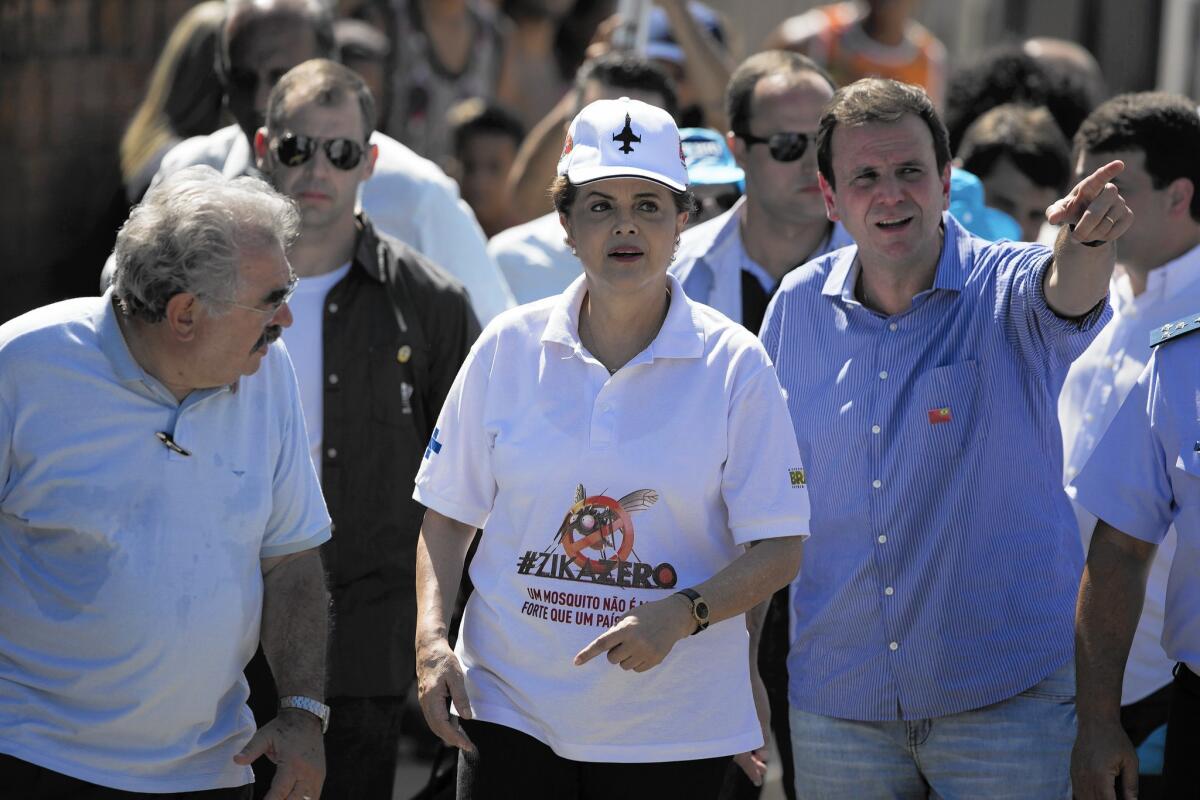Back Story: A look at efforts to impeach Brazilian President Dilma Rousseff

- Share via
reporting from RIO DE JANEIRO — Brazilian President Dilma Rousseff faces huge challenges as she tries to govern the world’s fifth-most populous country during a period of serious economic turmoil. But at the moment, she has a more pressing problem.
Rousseff, who was narrowly reelected in 2014, is facing impeachment proceedings in Brazil’s Congress and could have her reelection annulled. She hasn’t been convicted of anything and could very well stay in office, but this political battle is likely to cast a shadow on democracy in Latin America’s largest country for months.
What is she facing impeachment for?
Allegations of violating fiscal responsibility laws. Late last year, lower house Speaker Eduardo Cunha accepted a petition to open proceedings against her on charges that she used money from state-run banks to plug holes in the budget.
What’s the impeachment process in Brazil?
Brazil has a bicameral legislature, much like the United States, with a Senate and Chamber of Deputies. The chamber, the lower house, will analyze the arguments against her and then vote. If two-thirds agree to impeach, the process moves to the Senate.
If the Senate then votes in favor of impeachment, Rousseff would be suspended from office while the upper house decides whether she is guilty of the crimes with which she is charged. If she is found guilty, she would be permanently removed from office.
However, some aspects of the process remain murky. Over the next few weeks, the Supreme Court will finalize some crucial rules, such as how the members of a special impeachment commission are chosen, and how much relative power the Senate has in the process.
Are the impeachment proceedings related to the billion-dollar corruption scandal at the state oil company, Petrobras, which has led to the arrests of high-ranking political and business figures?
Legally, they have nothing to do with that far-reaching investigation, known as “Lava Jato,” or Car Wash, which has uncovered a multibillion-dollar corruption scheme involving major construction companies.
But politically, the scandal has been crucial to eroding support for Rousseff to the levels that made impeachment a possibility in the first place, said David Fleischer, a political scientist at the University of Brasilia.
Opposition politicians were “looking for anything they could find to bring her down,” he said. “Popular discontent is pretty bad.”
Soon after her reelection, Rousseff embarked on a series of painful budget cuts as it became clear just how bad the economy had become, partially as a result of the implosion at Petrobras, one of the country’s most important companies.
As federal investigators made more arrests, the scandal edged ever closer to Rousseff as officials from her party were put behind bars. Rousseff formerly served as president of the board of directors at Petrobras, but she has not been directly implicated in the scandal. After months of recession and as more corruption was exposed, the number of survey respondents that rate her government as “good” or “excellent” dropped into the single digits and is now at 10%.
Will she be removed?
Many Brazil analysts think she is more likely to survive than lose this battle, but there are a number of ways the odds could change in favor of the impeachers.
Broadly speaking, the longer that the proceedings take, the more likely it is that the economy will worsen and diminish her support even further, said Joao Augusto de Castro Neves, Latin America director at the Eurasia Group in Washington.
“The balance of powers is still favorable to the government, as the bar to impeach is higher than the bar for her to stay,” he said. “The risk is that this could drag on and on.... If you have a vote later than currently is expected, later than April or May, this exacerbates the risks for her.”
Rousseff could also be removed, and new elections called, if electoral authorities rule that her 2014 campaign received illegal financing. The arrest last week of former Workers’ Party Treasurer Joao Santana, who worked on both of her campaigns, led analysts to believe the risks of this outcome are increasing.
Rousseff was first elected in 2010 after being handpicked by President Luiz Inacio Lula da Silva, a former metalworker who left office as one of the world’s most popular leaders.
Right, where’s Lula?
Lula is still a powerful force in the ruling Workers’ Party and is active in the press defending Rousseff and his party’s legacy. But he’s also made headlines for the wrong reason recently as the news media have reported that properties linked to the former president are being investigated for their relation to construction companies involved in the Lava Jato investigation.
There’s little indication of wrongdoing yet and Lula has said he’s recently been the victim of “blows below the belt,” but in the last few years, Brazilian politics has already taken a lot of unexpected twists.
Will this be resolved before the Rio Olympics in August?
Rousseff sure hopes so, but it’s not guaranteed. Meantime, she has her hands full, with the challenges of the Zika virus, preparations for the Olympics and what may be the worst recession in Brazilian history.
Bevins is a special correspondent.
More to Read
Sign up for Essential California
The most important California stories and recommendations in your inbox every morning.
You may occasionally receive promotional content from the Los Angeles Times.










